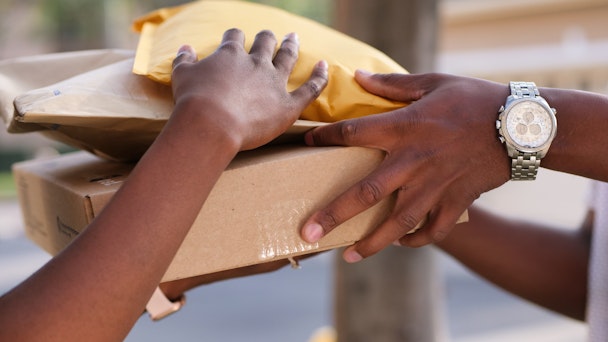Returns are killing retailers & the planet: can ad industry strategists find a solution?
Returns behavior is bringing retailers to their knees with the likes of Boohoo blaming returns on its 92% profit loss and Asos posting a £291m pre-tax loss – free returns being a factor. But how could retailers change this ingrained behavior? We asked five leading strategists to answer that brief.

How should retailers take on the returns crisis / Pexels
The statistics speak for themselves. In the UK, customers return £7bn of internet purchases every year, while more than a fifth of all clothes bought online are sent back, according to Barclays. More than just a financial problem, it’s also damaging the planet. In 2022 returns generated an estimated 750,000 metric tons of CO2 emissions in the UK alone.
Earlier this year, Asos posted a bleak pre-tax loss of £291m for the six months to the end of February. Investors, on its earnings call, questioned the online retailer on its generous returns policy.
Despite the cost to its margins and the fact that 12% of Asos’ total carbon footprint is believed to go on returns, Asos’ chief executive, José Antonio Ramos Calamonte, remains firm on its policy. “I acknowledge that some of our competitors are currently charging for returns. We consider that free returns are a critical part of our value position, we are not considering charging for returns,” Ramos Calamonte told reporters back in October.
Advertisement
What is more worrying is returns are in a period of increase and not decrease. Barclay’s research found that 26% of retailers have seen a rise in in-store and online returns over the last two years, with the number of returned items up by 22% on average.
Buy now pay later apps like Klarna and Clearpay are responsible for rising return rates as shoppers can try on items and send them back before spending a penny. That trend has been exacerbated by the shift to online shopping during the pandemic.
While there are many tech solutions, including try-on products which help shoppers find the right fit and even AR filters, we wanted to explore how marketing and communications could change consumer behavior.
We briefed five strategists on the challenge facing retailers and asked for their pitch.
Advertisement
Katie Mulligan, senior strategist, Wunderman Thompson: ”As an Asos shopper, poised to purchase the latest in quick-turnaround fashion, sustainability likely isn’t top of your agenda. For fast fashion lovers, their priorities lie in value, quick delivery – and the absolute latest in trends. Whilst their returns behavior is certainly not great for the planet, neither are the rest of their shopping behaviors, so talking to sustainability is unlikely to shift the dial.
"I might take a loss-aversion approach. Explain the financial implications and communicate how that is ultimately passed onto consumers; it’s radical transparency. Highlight how irresponsible returns behavior will impact the prices and services Asos can offer.
"Another idea might be to establish a rating system, much like Uber. Shoppers would be rated based on their behaviors; over-orderers would get points deducted and those with low return rates would be rewarded with early access to collections and exclusive discounts.
"Finally, it might be worth considering a more holistic approach to tackle the root of the problem. Clothing hauls, single-wear outfits, daily drops – these are all contributing to their issue. Asos could switch up their influencer roster by moving away from the Love Island-style Instagrammers, and towards those that value slower fashion, positioning careful, considerate shopping as the real trend."
Simon Gregory, chief strategy officer, BBH: ”Make people feel the impact of delivery and returns at the point of purchase. Offering offsetting might be a first step. You could also use the delivery boxes to carry messaging on the impact of deliveries.
”Could going offline help solve online? Open small stores as try-on hubs or partner with other high street stores (like Argos in Sainsbury’s) to make it easier for people to try on and return. Expand the free delivery service into more of a 'Prime’ model. You’ll always get three returns (or similar) for free, but upgrade (ie pay) to our next tier and you’ll get more.
”Be a bit naughty and make returning more frustrating. Massive parcels, reduce return locations, etc. Naughty, but effective.”
Suggested newsletters for you
Tom Moore, UK head of commerce, VMLY&R: ”Asos has a unique opportunity to tackle its returns challenge alongside a second big-ticket issue – sustainability. The impact of free returns links intrinsically to environmental costs. We all value the convenience of no-fee returns – it overcomes a common online shopping barrier by trying on at home and returning what we don’t like or doesn’t fit. Yet, environmental concern is a major purchase decision-maker.
”Firstly, by implementing technology into the customer experience – integrating AR or body scanning tech to offer virtual fitting rooms and using nudges to remind people with multiple sizes in their basket to reconsider or check the size chart before checkout.
”Secondly, embracing transparency and visualizing the impact of returns behavior. Asos could calculate the environmental impact of a return – feature this prominently on its home and product display pages as shoppers review baskets – urging people to consider before they hit buy. Beyond the single impact of purchase action, customer account pages would reveal a cumulative effect – ‘this year your returns have generated X tons of carbon‘.”
Ella Britton, strategy director, Behave: ”The way we understand money is highly illogical. Mental accounting is the different value we place on the same amount of money depending on how we earn it, how we intend to use it, and how it makes us feel. This explains why, for example, we might be willing and perfectly happy to pay for our clothes to be delivered quickly but absolutely furious when it comes to paying for a return. We attach different emotions to the transaction depending on what we think is ‘reasonable.' So, to stop people from rioting, you must package the news up in a way that feels more palatable… A shit sandwich, if you will.
”If you start charging for returns, it would be wise to layer the news between two positives. Start with the immense benefits of reducing returns for the environment. It is pretty shocking how horrendous continuous returns are on the planet; last year in the UK alone, returns generated an estimated 750,000 metric tons of CO2 emissions, and nobody can argue with that. Then comes the ‘shit’ part of the sandwich, introducing paid returns. Communicate clearly and be fully transparent; people want to know what they are paying for, so lay it all out.”

